Anna Karenina and The Rolling Stone at West Yorkshire Playhouse reviewed
May 31, 2015
[All images credited to Jonathan Keenan]
Anna Karenina
It is quite unusual to have two shows running simultaneously that draw on the same cast and creatives. But the current co-productions of Anna Karenina and The Rolling Stone by West Yorkshire Playhouse and Royal Exchange Theatre do just that, though with varying levels of success. The pre-eminent of the two is undoubtedly Jo Clifford’s adaptation of the Tolstoy classic and epic novel. It looks at the nature of love in the face of endemic social expectations around class and duty. It sees Anna’s failed marriage leading her into a tempestuous affair with her object of desire, Count Vromsky, which is seen as scandalous and improper. Alongside this, childhood friends Levin and Katy marry, but in reality his love for her is somewhat unrequited, despite her devotion as a mother.
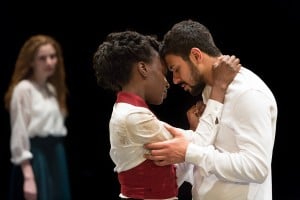
Ironically the tale begins with Anna convincing her sister Dolly to forgive her husband’s adultery. Then we see Anna with her own pompous partner who she goes on to dishonour, despite his protestations at her public intimacy with Vromsky. The action takes place against a country beset by Alexander II’s agricultural reform and Levin serves as Tolstoy’s alter ego with his idealistic concepts on the subject that takes up so much of the detail in the original novel.
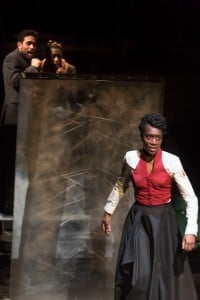
Joanna Scotcher’s design is minimal: a railway track with an oblong of earth at its centre. It is used to depict both Anna’s downfall, with Karenina slinging mud at her in a scene straight out of Buñuel’s Belle de Jour; and her demise, where the train lines come in to play in the abrupt finale. The Courtyard for both of these productions has been transformed to be in the round, and this does cause difficulties for the cast to display their parts to all sides of the stage simultaneously. But Clifford has done a great job in truncating the epic into a series of symbolic sequences. And the casting of the characters and their direction by the irrepressible Ellen McDougall is second to none.

Ony Uhiara’s Anna is suitably complex and played with impassioned intensity, while her cuckolded husband is given a comic take by Jonathan Keeble, though we are very much laughing at him rather than with him. Robert Gilbert as Vromsky reveals his character as a flirtatious player who shows the double standards of society’s judgements; where Anna is marked as a fallen woman, he is revered as a man about town.
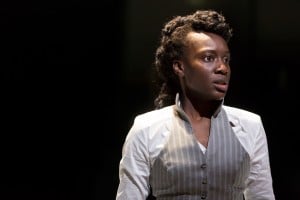
Anna Karenina plays at West Yorkshire Playhouse until 13 June.
The Rolling Stone
Gilbert plays an entirely different role in The Rolling Stone, as Dembe’s Irish lover Sam, set in contemporary Uganda. This is a place where the extreme repression of homosexuality has gone to the levels of a sadistic witch hunt. Here no one is safe from the paranoiac ferocity of the colluding media, church and state. Ironically Dembe’s brother Joe takes great pride in becoming the pastor of an evangelical church, and it is the religious bigotry within this institution that places further pressure on its members to expose ‘sodomites’.
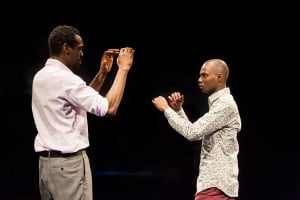
After her deft performance as Anna, Ony Uhiara has a minor role as a mute teenager who is being sent on an enforced date with Dembe. And it is when the two are on a night out on a boating lake that the news comes of the ‘outing’ of Dembe’s secret gay affair. The title of the show comes from a newspaper that publishes photos of those accused of being a ‘kuchu’ (a derogatory anti-homosexual term). The results of this are devastating, with public lynching by vigilantes and long prison sentences for both those implicated and their families.
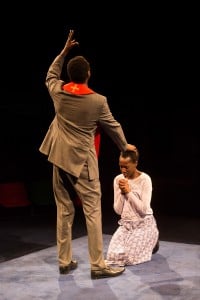
Chris Urch’s writing is incisive and clearly captures the xenophobic and homophobic zeitgeist of modern day Uganda. McDougall’s direction again is supremely confident and carries great depth and emotion that the ensemble brings out with dexterity and dynamic energy. Scotcher’s simple design sees a blue velvet strip with a raised area that starts as the idyllic and intimate meeting place of Dembe and Sam and then finally as the scene of a terribly tragic and tempestuous end.
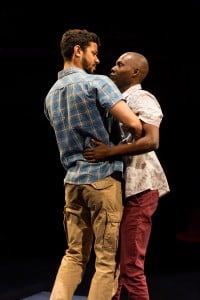
However, I do have reservations in the way we are thrown into the two men’s relationship initially, without any real backstory. Whilst they are both clearly sexual partners (Sam is particularly explicit about this) there is a certain lack of evidence of love or romance. Perhaps this is deliberate, to show the impossibility of true love in such a psychopathic society. But it does rather remove some of the empathy we have for them in the face of adversity. Clearly we still want them to be free but their case is not helped when we see Sam so quick to doubt Dembe’s sincerity. And Dembe himself gives an impassioned hypocritical speech on turning in his own brother if he suspected him of deviance. This is for show, we assume, but does confuse our emotions. Though one thing is clear for sure, this mad persecution in Africa and its more subtle forms of prejudice at home are highlighted eloquently by Urch in this powerful play that both moves and informs us.
The Rolling Stone played at West Yorkshire Playhouse, 12 to 23 May.
Rich Jevons
Filed under: Politics, Theatre & Dance
Tagged with: Anna Karenina, play, review, The Rolling Stone, theatre, West Yorkshire Playhouse
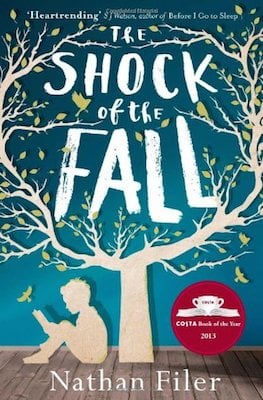
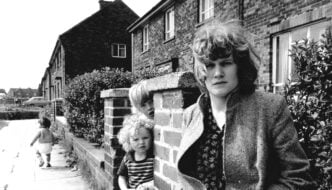
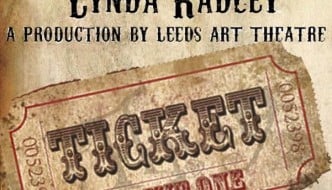
Comments